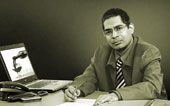 |
When Suborno Bose walks confidently into the spacious lobby of the multi-storied Tower Building in Calcutta’s Salt Lake, you have to spare him a second glance.
No, there is nothing flamboyant about him. There is nothing to indicate that this unassuming man — lean, with salt-and-pepper hair, and dressed casually in an off-white cotton coat and brown trousers — is the owner of a business enterprise, Suborno Bose Enterprise, which boasts an annual turnover of Rs 40 crore. But he exudes an aura of confidence that commands attention. Besides, he also owns the Tower Building.
When you get talking to Bose, you realise it is the confidence that counts. That is all he was armed with when he ventured into uncharted territory. Early on in life, he decided that he didn’t want to work for anyone else.
Born into a middle-class Bengali family in Calcutta in 1963, Bose calls himself “a first-generation entrepreneur” who had no role-model as far as independent business ventures were concerned. “My father held a regular job and my mother was a housewife,” he says. “Of course, the politically correct word today is homemaker.”
Bose was a student of South Point School. After completing his 12th, he opted for commerce at St Xavier’s College. He also did a Chartered Accountancy (CA) course. He points out that “at the time you could do your accountancy internship while you did your graduation”. At 23, he was a qualified CA.
Bose decided to open his own firm. Bose Associates was “just a couple of rooms in my house in Tollygunj”. He also began to conduct classes in chartered accountancy in four to five batches of 30 to 35 students each, seven days a week. “I started the day very early, and ended late. But I enjoyed teaching. And it was especially satisfying to see my students not only do well in exams, but get top marks.”
Did it make money? Was teaching from home a lucrative enough alternative for a bright student like him, who had received one of the few first divisions in CA in his year? “There were not too many teachers in subjects like accounting and income tax,” he says. “So a lot of people came to me and the money was very good.”
However, Bose admits that he had bigger goals. He was driven by his dream of “creating something”. So on April 1, 1989 (“It was only a coincidence that it was All Fool’s Day”), he started a business management school called the Institute of Advanced Management. He, however, does not like to call his institutes B-schools. He prefers L-schools — L for leader.
The catalyst for this came when he was approached by the UK-based Confederation of Hotel Catering and Tourism in Surrey. They told him that they were interested in setting up shop in India and asked him if he would be their partner. “I was both elated and a bit sceptical,” he recalls. “I wasn’t sure of their credentials. So I went to the British Council to find out whether it was a fake company or not.” It was the real thing.
The duo started the Indian Institute of Hotel Management in Salt Lake. Of course, Bose had to familiarise himself with the hospitality business. “I started reading about hotel management.” But Bose’s experience in teaching business management helped him make a smooth transition into teaching catering and hotel management. “Initially we started with only 13 students,” he says. “But the number grew steadily.” It was soon necessary to open other institutes.
One of Bose’s most successful strategies was to combine the teaching of hotel management with the opening up of hotels. “I have always believed in applied learning. Like medical students gain their knowledge and experience working with real patients, I wanted my students to learn while they serve.” So Bose’s institutes also double as hotels. It goes without saying that the revenues too are double. “Yes, I think the concept works,” he says.
Bose has other plans now. There will be a foreign foray, to Dubai and the UK, for instance. My motto is “dare to do”. He will continue to have new challenges on his menu.
Based on a conversation with Dola Mitra in Calcutta










